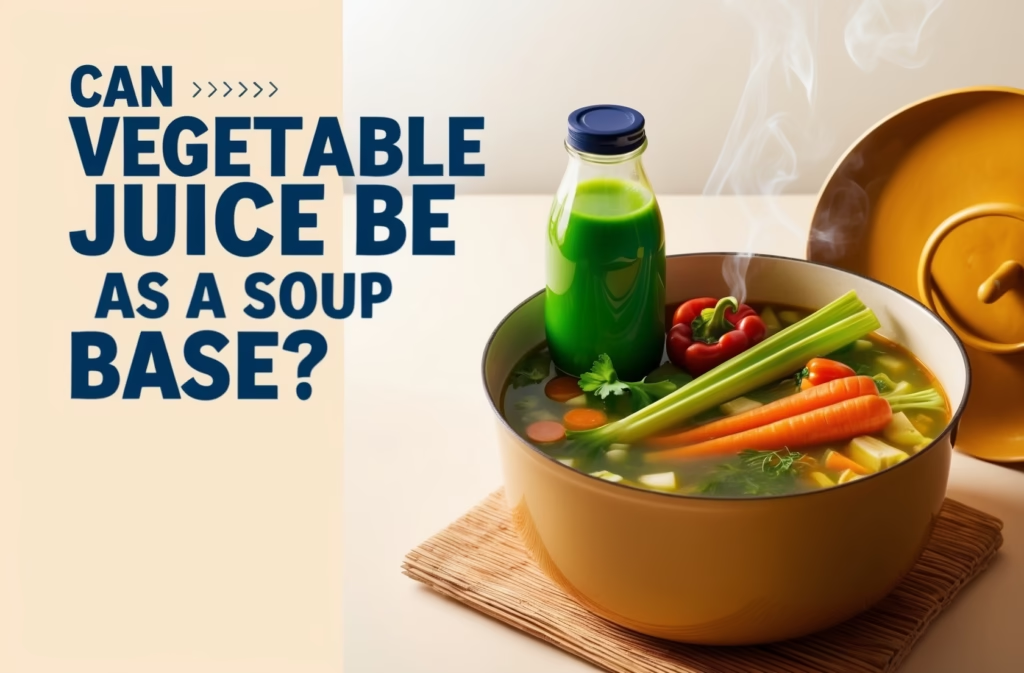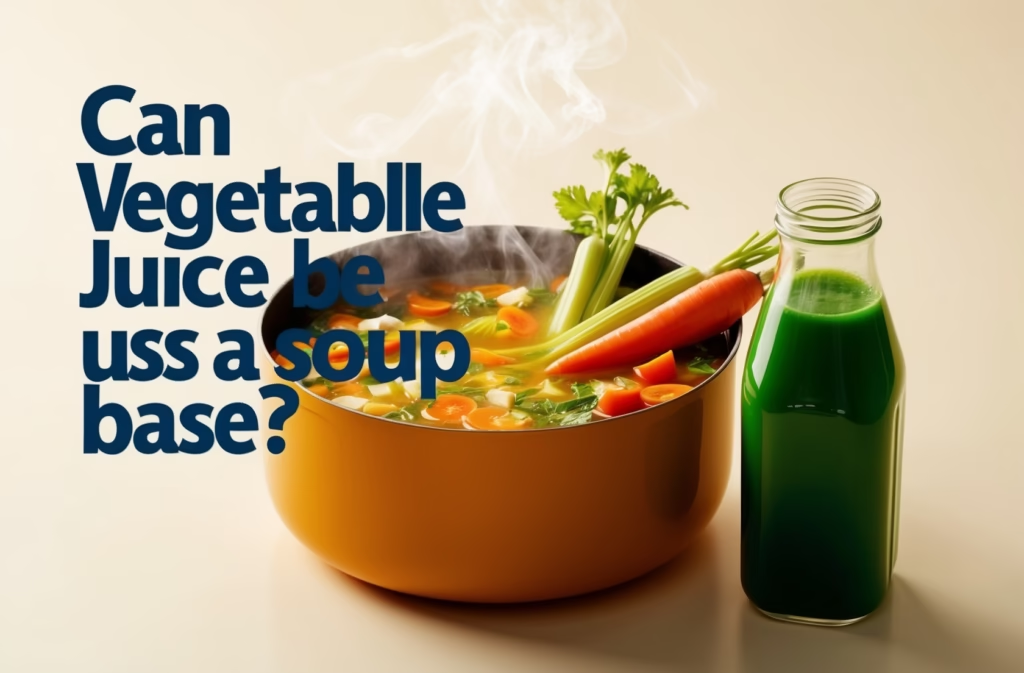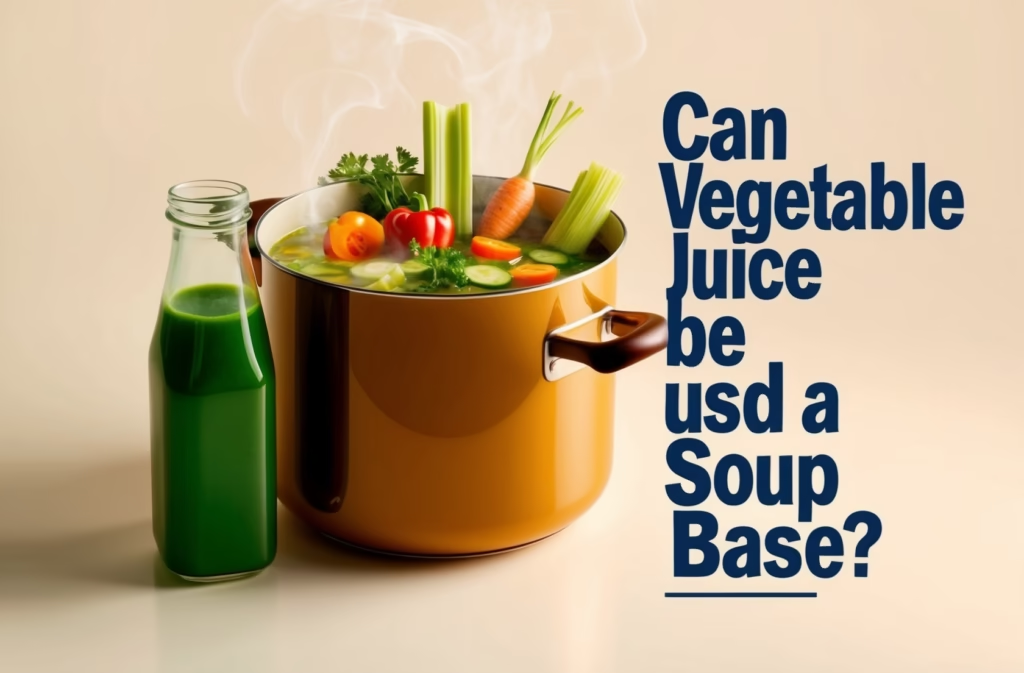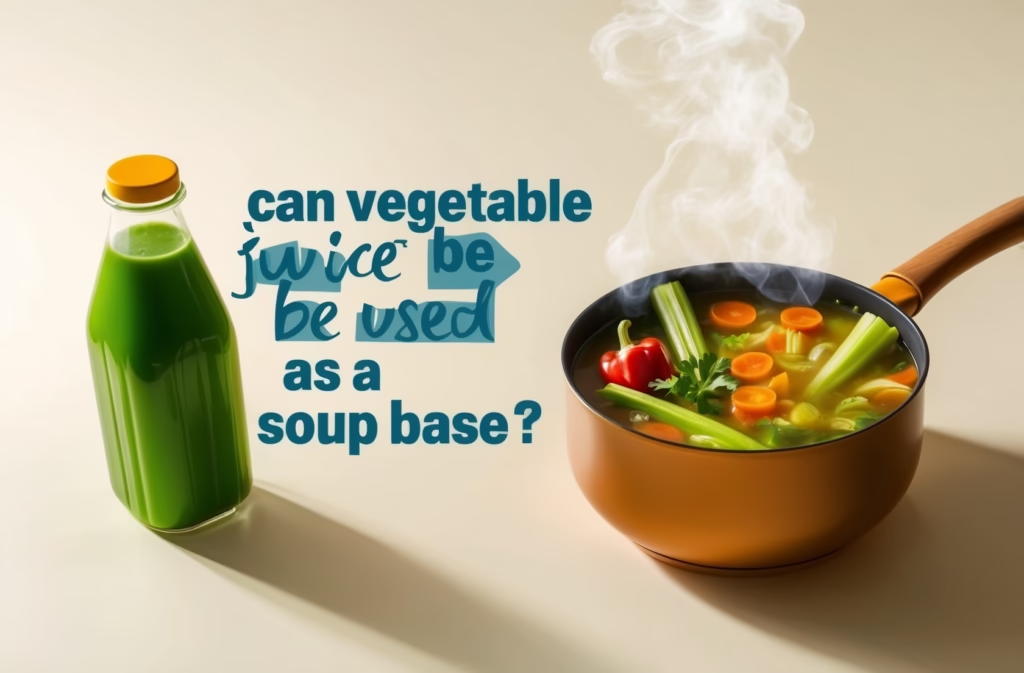Can Vegetable Juice Be Used As A Soup Base

Discover if vegetable juice makes a great soup base! Learn how to make delicious & healthy Vegetable Juice Soup. Find the best vegetable juice for soup and get our easy recipe. Save time & boost flavor!
Can Vegetable Juice Be Used As A Soup Base? A Deep Dive
The question, “Can vegetable juice be used as a soup base?” is a surprisingly versatile one. The answer, in short, is a resounding yes! Vegetable juice offers a fantastic shortcut to building flavorful and nutritious soup foundations. It eliminates the need for lengthy stock-making processes, allowing you to create delicious soups quickly and easily. This article explores the possibilities, delving into the best types of vegetable juice for soup, tackling common concerns, and providing tips for creating unforgettable vegetable juice soup recipes.
Exploring the Versatility of Vegetable Juice as a Soup Base
Using vegetable juice as a soup base opens up a world of culinary possibilities. Forget spending hours simmering bones and vegetables; a simple carton of pre-made juice can be the key to a quick and healthy meal. The inherent flavor profiles of different juices translate directly into the character of your soup. A rich tomato juice, for instance, instantly lends a deep savory depth to a minestrone, while a lighter, more herbaceous juice like a green juice, offers a fresh and vibrant base for lighter vegetable soups. The possibilities are truly endless!
The Advantages of Using Vegetable Juice as a Soup Base
Beyond its convenience, using vegetable juice offers several significant advantages:
- Time-saving: It significantly reduces prep and cooking time compared to making your own stock.
- Flavor enhancement: Pre-made juices often contain a blend of herbs and spices, adding depth of flavor to your soup.
- Nutrient boost: You’re incorporating a concentrated dose of vitamins and minerals from the start.
- Experimentation: You can easily adjust the flavor profiles by mixing different types of juice to create unique taste combinations.
Choosing the Best Vegetable Juice for Soup
The best vegetable juice for soup depends heavily on the type of soup you’re making. However, certain juices lend themselves particularly well to this application.
Tomato Juice: The Classic Choice
Tomato juice is a timeless classic for a reason. Its rich, savory flavor provides an excellent base for numerous soups, from hearty minestrones to simpler tomato-based creations. Its natural acidity also helps balance the flavors of other ingredients. The depth of flavor makes it a perfect pairing for pasta, beans, and hearty vegetables.
Green Juice: A Lighter Approach
For those seeking a lighter, more refreshing soup, a vibrant green juice can be a fantastic option. A blend of leafy greens, like kale and spinach, paired with perhaps some apple or cucumber for a touch of sweetness, creates a healthy and flavorful base. Consider adding some pear to enhance the sweetness further – like our pear kale juice, and you’ll find an inspiring start for your creation. This type of juice is ideal for soups featuring lighter vegetables and herbs.
Other Options to Consider
Beyond tomato and green juices, other options can work well, depending on your desired flavor profile. A green apple juice can add a subtle sweetness, while beetroot juice provides an earthy depth and vibrant color. The possibilities are endless! You can even experiment with blending different juices to obtain your unique flavour.
For example, a fruity twist can be added using juices like peach-mint juice or cherry-lime juice, although this will require additional savory ingredients to achieve a balanced soup.
Sweet fruit juices such as mango-orange juice work very well with Asian inspired soups, that incorporate elements such as coconut milk and ginger, but would need careful consideration and blending with more savory options.
Addressing Common Concerns about Using Vegetable Juice in Soup
While using vegetable juice as a soup base offers numerous benefits, some concerns might arise. Let’s address them:
Salt Content: Managing Sodium Levels
Many commercially produced vegetable juices contain added salt. To control sodium intake, choose low-sodium or no-salt-added options. Alternatively, you can dilute the juice with water or broth to lessen its saltiness.
Sugar Content: Balancing Sweetness and Savory Flavors
Some fruit-vegetable juice blends might have higher sugar content. When using these, ensure to balance the sweetness with savory ingredients like herbs, spices, and vegetables to achieve a well-rounded flavor profile.
Flavor Intensity: Adjusting to Your Preferences
The intensity of the vegetable juice’s flavor can vary. If you find a particular juice too strong, dilute it with water or broth. Conversely, if the flavor is too subtle, you can add more concentrated juice or enhance it with complementary herbs and spices.
Creating Delicious Vegetable Juice Soup Recipes
Once you’ve chosen your preferred vegetable juice, the possibilities for vegetable juice soup recipes are endless. Consider these tips for building delicious and nutritious soups:
- Start with a good base: Choose a juice that complements the other ingredients you plan to use.
- Add aromatics: Onions, garlic, and ginger enhance the depth of flavor.
- Include vegetables: A variety of vegetables adds texture, nutrition, and visual appeal.
- Season generously: Herbs, spices, and a pinch of salt and pepper can elevate your soup’s taste.
- Simmer to perfection: Allow the flavors to meld by simmering the soup for at least 15-20 minutes.
Beyond the Basics: Advanced Techniques for Elevated Vegetable Juice Soups
For those wanting to take their vegetable juice soup game to the next level, here are a few advanced tips:
- Roast your vegetables: Roasting vegetables before adding them to your soup intensifies their flavor and adds a beautiful depth to the finished product.
- Add protein: Incorporate lentils, beans, chickpeas, or even shredded chicken or tofu for a more substantial and satisfying meal.
- Garnish thoughtfully: Fresh herbs, a dollop of yogurt or crème fraîche, a sprinkle of cheese, or a drizzle of olive oil can elevate the presentation and taste.
- Experiment with different cooking methods: Consider using a blender to create a creamy soup or leaving some ingredients chunky for added texture.
Resources for Inspiration and Further Learning
For more inspiration and in-depth information on soup making, check out these resources:
For comprehensive information on healthy eating and nutrition, visit the NHS website.
For a vast collection of soup recipes and cooking techniques, explore the Allrecipes website.
Call to Action
Ready to embark on your vegetable juice soup adventure? Experiment with different juice blends, vegetable combinations, and seasonings to create your signature soup! Share your culinary creations on social media using #VegetableJuiceSoup and tag us! We can’t wait to see what deliciousness you whip up. Leave a comment below sharing your experience and any tips you’ve discovered along the way.

FAQ: Using Vegetable Juice as a Soup Base
Q: Can vegetable juice be used as a soup base? A: Yes, vegetable juice makes an excellent, flavorful soup base, adding vitamins and reducing prep time. A simple Vegetable Juice Soup Recipe can be built around this.
Q: What are the benefits of using vegetable juice as a soup base? A: It adds flavor, vitamins, and minerals. It also reduces cooking time compared to starting with raw vegetables.
Q: What type of vegetable juice is best for soup? A: Hearty juices like tomato, beet, or carrot juice work well. The best vegetable juice for soup depends on your desired flavor profile.
Q: Can I use any vegetable juice for a soup base? A: While most work, avoid juices with heavy cream or added sugars, as they may alter the soup’s consistency and flavor.
Q: How much vegetable juice should I use in a soup recipe? A: Start with about half the amount of liquid you’d normally use in a soup recipe, adjusting to your preference.
Q: What kind of vegetables pair well with vegetable juice soup? A: Vegetables complementing the juice’s flavor are ideal. For example, carrots and celery pair well with tomato juice.
Q: Can I use vegetable juice concentrate as a soup base? A: Yes, but dilute it with water or broth according to the package directions before adding to your soup.
Q: Does using vegetable juice impact the soup’s nutritional value? A: It enhances it by adding nutrients present in the juice. A Vegetable Juice Soup Recipe using nutritious juices further boosts the nutritional content.
Q: Can I make a vegetarian or vegan soup using vegetable juice? A: Absolutely! Vegetable juice is naturally vegetarian and vegan-friendly.
- Q: Where can I find recipes using vegetable juice as a soup base? A: Many online resources and cookbooks offer delicious Vegetable Juice Soup Recipes, providing variations for different vegetable juice types.

Can Vegetable Juice Be Used As A Soup Base? A Deliciously Simple Yes!
The question, “Can vegetable juice be used as a soup base?” is a resounding yes! It’s a fantastic shortcut to building flavor and adding nutritional depth to your soups. This method not only saves time but also allows for creative experimentation with different vegetable juice varieties. This article will explore the possibilities of using vegetable juice as a soup base, offering a delicious recipe and guidance on choosing the best vegetable juice for soup.
Why Use Vegetable Juice as a Soup Base?
Using vegetable juice as a soup base offers several key advantages:
- Flavor Boost: Vegetable juice provides an immediate base of intense flavor, eliminating the need for lengthy sautéing of aromatics.
- Nutritional Enrichment: You’re adding a concentrated dose of vitamins and minerals right from the start.
- Time Savings: Skip the stock-making process and jump straight to building your soup.
- Versatile Base: Different juices lend themselves to different soup styles, offering endless culinary possibilities.
Choosing the Best Vegetable Juice for Soup
The best vegetable juice for soup depends on the desired flavor profile. For a sweeter soup, consider juices like pear-kale juice or peach-mint juice (though this would be more of a cold soup base). For something more savory, a robust blend of carrots, tomatoes, and celery works wonders. Even juices like green apple juice can add a surprising sweetness and acidity to heartier soups.
Avoid juices that are overly sweet or contain added sugars, as this could negatively impact the overall balance of your soup. Look for juices with minimal added ingredients; ideally, just the vegetables themselves. The EatingWell article on making vegetable juice at home provides excellent tips on choosing fresh produce and maximizing flavor.
For a more tart base, consider using something like cherry-lime juice to give a refreshing twist. This works particularly well with lighter, summery vegetable soups. For something richer, mango orange juice adds an unexpected sweetness, but it might work better as an element rather than an entire base for your soup, or it could greatly complement other savory flavors.
Simple & Delicious Vegetable Juice Soup Recipe
Ingredients:
- 2 cups vegetable juice (carrot, celery, tomato blend recommended)
- 1 cup chopped carrots
- 1 cup chopped celery
- 1 cup chopped potatoes
- 1/2 cup chopped onion
- 2 cloves garlic, minced
- 1 teaspoon dried thyme
- 1/2 teaspoon dried rosemary
- Salt and pepper to taste
- 1/2 cup cooked lentils (optional, for added protein and texture)
- Fresh parsley for garnish
Instructions:
- In a large pot or Dutch oven, sauté the onion and garlic in a tablespoon of olive oil until softened, about 5 minutes.
- Add the carrots, celery, and potatoes to the pot. Stir well to coat with the oil.
- Pour in the vegetable juice, ensuring the vegetables are mostly submerged.
- Add the thyme and rosemary. Season with salt and pepper to taste.
- Bring the mixture to a boil, then reduce heat and simmer for 20-25 minutes, or until the vegetables are tender.
- If using lentils, stir them in during the last 5 minutes of simmering.
- Once the vegetables are cooked, use an immersion blender to partially blend the soup, leaving some texture. Alternatively, carefully transfer the soup in batches to a regular blender and blend until smooth.
- Taste and adjust seasoning as needed.
- Garnish with fresh parsley before serving.
Nutritional Information (per serving, based on 4 servings):
Note: This nutritional information is an estimate and may vary depending on the specific ingredients used and their nutritional content. The values provided are based on average nutritional data for common ingredients. For a precise calculation, use a nutrition calculator with your specific ingredient brands.
| Nutrient Name | Amount per Serving | % Daily Value (2000 calorie diet) |
|---|---|---|
| Calories | 150-200 | 7.5-10% |
| Protein | 5-7g (including lentils) | 10-14% |
| Total Fat | 3-5g | 5-8% |
| Saturated Fat | 1g | 5% |
| Unsaturated Fat | 2-4g | – |
| Trans Fat | 0g | 0% |
| Carbohydrates | 25-35g | 8-12% |
| Sugar | 5-10g (depending on juice type) | – |
| Fiber | 5-7g | 20-28% |
| Vitamin A | High | >100% |
| Vitamin C | Moderate | 20-40% |
| Potassium | Moderate | 10-20% |
| Iron | Low-Moderate | 5-15% |
This recipe offers a delicious way to increase your daily intake of vitamins and minerals, fiber, and antioxidants. The addition of lentils adds a significant protein boost. The nutritional content greatly varies based on the type of vegetable juice used as a base.
For more information on the nutritional benefits of vegetables, you might find the NHS guidelines on healthy eating helpful.
Summary of Nutritional Features
This vegetable juice soup recipe is a nutritional powerhouse, offering a good source of vitamins (particularly A and C), fiber, and moderate amounts of protein and minerals. The nutritional content can be easily tailored to your dietary needs by selecting different types of vegetable juice and adding other ingredients.
Call to Action
Ready to experience the deliciousness and convenience of this vegetable juice soup recipe? Give it a try and let us know what you think! Share your culinary creations using #VegetableJuiceSoup on social media. Don’t forget to leave a comment below with your experience and any variations you tried. Let’s create a vibrant community of soup lovers!

Using Vegetable Juice as a Soup Base
Vegetable juice can indeed form a flavorful and nutritious base for soups, offering a quick and healthy alternative to traditional broths. The success depends heavily on the type of juice you choose. Juices with a robust, savory flavor profile will work best. For example, a hearty pear and kale juice, though sweet, possesses an underlying earthiness that could complement a root vegetable soup. Avoid juices that are overly sweet, like a peach and mint juice or a mango and orange juice, as these will likely clash with savory soup ingredients.
Consider the consistency. Vegetable juices vary in thickness. Thinner juices, such as a green apple juice, might need thickening agents like pureed vegetables or a roux to achieve the desired soup texture. Thicker juices, like those made with leafy greens, might require less adjustment.
Health considerations are important. While vegetable juice can be a healthy addition to your diet, be mindful of added sugars and sodium content. Many commercially produced juices are high in these, which could negatively impact your health. Opt for freshly made juices whenever possible to control the ingredients and minimize added sugars. Additionally, remember that juice alone lacks the fiber found in whole vegetables. While the juice adds nutrients and flavor to the soup, ensure you are getting enough fiber from other sources.
For a balanced approach, combine the juice with other nutritious elements in your soup. Consider adding beans, lentils, or whole grains for added protein and fiber. A splash of cherry lime juice could even add a bright, unexpected twist to some soups, but use it sparingly to avoid overpowering the other flavors. Remember to taste and adjust seasonings as needed.
In summary, using vegetable juice as a soup base offers a creative and potentially healthy cooking approach. By carefully selecting the right juice and considering both its flavor and consistency, you can create delicious and nutritious soups. Always be conscious of potential health considerations, and ensure a balanced nutritional intake by complementing the juice with other wholesome ingredients.